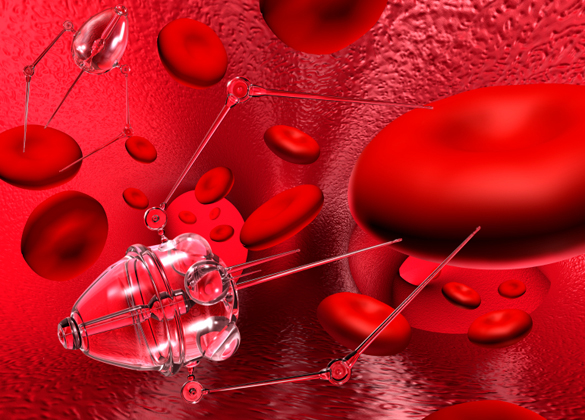Google on 28th October 2014 at Wall Street Journal Digital Conference, reveals that Google X Lab is designing a nanotechnology particles, Google wants your body to host a search engine by using a Pill such particles can travel within body for early diagnosis of cancer and other diseases. Early diagnosis is the key to treating the disease. Many cancers, such as pancreatic, are detected only after they have become untreatable and fatal. Google nanotechnology particles of width less than one-thousand the width of red blood cells that can automatically find and attach to the other molecules, cells, proteins or inside the body. Google is also developing a magnetic wearable device, used to calculate the particle distribution. Google’s goal is early diagnosis of cancer and other diseases, and to focus on more effective treatment.
Leader Google X Lab, Life Sciences Group Andrew Conrad said, We’re passionate about switching from reactive to proactive and “With this system you can do it on their own hospitals all diagnostic tests, this is our dream.”
But the reality is that this project could not be completed within five years, and facing enormous challenges technical, regulatory and social fields. Researchers need to be able to help identify the particles to bind to specific cell guide agent. Google does not know how much making the system work properly nanoparticles. And wearable devices need to be small enough to not be too conspicuous, but it comes with the appropriate battery, so that does not require frequent charging.
Google may offer these nanoparticles in the form of Pill. This means that users need to swallow pills, such a system will face much higher than conventional diagnostic tools supervision.
In addition to technical and regulatory difficulties, this technique also involves social issues, such as privacy. Google 24 hours to monitor body function concept is likely to make an users’ fear loss of privacy. There are already a lot of people complain about Google company has too much user information. Andrew Conrad said that Google does not collect or store medical data itself. Instead, Google plans to license its technology to other organizations will secure processing of these data.
In the Google X Lab, Life Sciences team wants to use these data to make drugs become more proactive, rather than worsen after treatment. The research goal is to establish a database of human health. The magnetic nanoparticles projects involving physics, chemistry and electrical engineering in the field of more than 100 Google employees. Google did not disclose the expenditure of the project.
Promising applications of nanotechnology in medicine, but now there are few successful commercial products. The American government investment in nanotechnology research since 2001 more than $ 20 billion, of which health-related investments of approximately $ 4.3 billion.

